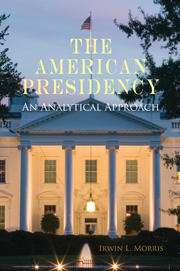Book contents
- Frontmatter
- Contents
- 1 Introduction
- 2 Science and the Study of the Presidency
- 3 The Presidency: Background and Foundations
- 4 Theories of Presidential Power
- 5 Electing a President
- 6 Congress and the President
- 7 The Supreme Court and the President
- 8 The President and the Executive Branch
- 9 The President and Foreign Policy Making
- 10 The President and Economic Policy Making
- 11 Presidential Greatness
- Bibliography
- Index
10 - The President and Economic Policy Making
Published online by Cambridge University Press: 05 June 2012
- Frontmatter
- Contents
- 1 Introduction
- 2 Science and the Study of the Presidency
- 3 The Presidency: Background and Foundations
- 4 Theories of Presidential Power
- 5 Electing a President
- 6 Congress and the President
- 7 The Supreme Court and the President
- 8 The President and the Executive Branch
- 9 The President and Foreign Policy Making
- 10 The President and Economic Policy Making
- 11 Presidential Greatness
- Bibliography
- Index
Summary
In the domestic political arena, macroeconomic policy making is often considered the most important substantive policy responsibility of the American president. Public opinion research demonstrates that the American public consistently identifies the economy or management of the economy as one of the top three policy concerns; during time periods in which there is not a prominent foreign policy threat, the economy is often the top policy concern of the American public. In a survey administered by the Pew Research Center for the People and the Press, respondents indicated that the top two policy priorities were the “economy” and “jobs.” A late April 2009 poll fielded by CNN produced similar results. When asked “Which of the following is the most important issue facing the country today,” 55% of the respondents indicated “the economy” – more than five times the number of respondents that indicated the second choice. Ironically, the second choice was “the federal budget deficit.”
Clearly, 2009 was an economically unusual time in American history. As we struggled through the deepest economic downturn since the Great Depression, it is no surprise that the economy topped the list of national policy concerns. What is interesting is that this economic focus is commonplace even during more productive economic eras, and the economy is never far from the public's mind. The economic focus of public opinion is not simply an academic exercise.
- Type
- Chapter
- Information
- The American PresidencyAn Analytical Approach, pp. 216 - 234Publisher: Cambridge University PressPrint publication year: 2010



